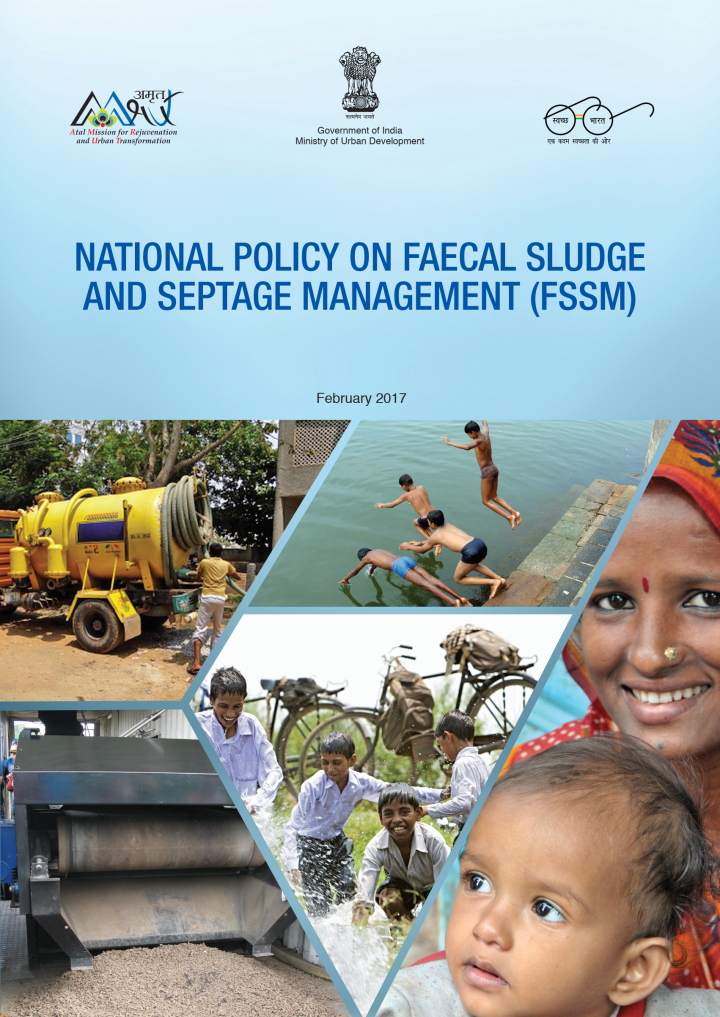National Policy on Faecal Sludge and Septage Management (FSSM) Government of India Ministry of Urban Development (2017)
According to Census 2011, India’s urban population is 377 million or 31% of the total population, which is expected to increase to 600 million by 2031. The Census 2011 also showed that in 4,041 statutory towns, 7.90 million households (HHs) do not have access to toilets and defecate in the opena1. Under the Swachh Bharat Mission (SBM), it is envisaged that nearly 80% of these 7.90 million HHs (or nearly 6.3 million HHs) will meet their sanitation needs through newly-built individual household toilet (IHHT) and the remaining 20% (or nearly 1.6 million HHs) will rely on existing or newly-built community toilets. Weak sanitation has significant health costs and untreated faecal sludge and septage from cities is the single biggest source of water resource pollution in India. Human waste has clearly been identified as the leading polluter of water sources in India, causing a host of diseases including diarrhoea, agricultural-produce contamination and environmental degradation. India’s bigger cities have large, centralized sewerage systems with vast underground pipelines, pumping stations and huge treatment plants. These systems are expensive to build and even more expensive to operate effectively, as they require continuous power, a large amount of water, skilled operators and extensive electro-mechanical maintenance. It is for this reason that India’s 7,000+ small towns do not have such systems ensus 2011, India’s urban population is 377 million or 31% of the total population, which is expected to increase to 600 million by 2031. The Census 2011 also showed that in 4,041 statutory towns, 7.90 million households (HHs) do not have access to toilets and defecate in the opena1. Under the Swachh Bharat Mission (SBM), it is envisaged that nearly 80% of these 7.90 million HHs (or nearly 6.3 million HHs) will meet their sanitation needs through newly-built individual household toilet (IHHT) and the remaining 20% (or nearly 1.6 million HHs) will rely on existing or newly-built community toilets. Weak sanitation has significant health costs and untreated faecal sludge and septage from cities is the single biggest source of water resource pollution in India. Human waste has clearly been identified as the leading polluter of water sources in India, causing a host of diseases including diarrhoea, agricultural-produce contamination and environmental degradation.
India’s bigger cities have large, centralized sewerage systems with vast underground pipelines, pumping stations and huge treatment plants. These systems are expensive to build and even more expensive to operate effectively, as they require continuous power, a large amount of water, skilled operators and extensive electro-mechanical maintenance. It is for this reason that India’s 7,000+ small towns do not have such systems and are unlikely to be covered by centralised sewerage systems in the near future.
Bibliographic information
Government of India Ministry of Urban Development (2017). National Policy on Faecal Sludge and Septage Management (FSSM) Government of India Ministry of Urban Development
Filter / Tags
EducatorsJournalistsPoliticians and local decision makersPractitionersFactsheets and policy briefsEnglishImport to Sanitation Workers PlatformLegal and regulatory frameworksHealth & SafetyLegal and regulatory frameworksHealth & Safety
Downloads
National Policy on Faecal Sludge and Septage Management (FSSM)
Type: application/pdf
Size: 11.79 MB

